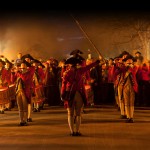Here’s What You Need to Know (and Do) Before You Depart
Planning and preparing for a large school trip can seem like a daunting task. But, based on our years of experience running educational group trips, we have learned a few tricks. To help make sure your trip is both safe and free from unexpected obstacles, we have compiled these tips on how to prepare for a school trip:
First Steps
Survey your students to determine the level of interest in a trip.
Consider your total count of students and adults. Motorcoaches typically seat 55 or 57 passengers. Remember to save one seat for your tour manager or local guide.
Discuss the trip with your administrator for date options and approval procedures. Do this early to avoid scheduling conflicts.
Contact Julian Tours with your choice of dates. At this time, we can reserve your package and furnish you with a contract and informative flyers.
Distribute the flyers as provided by Julian Tours along with your permission slips. You can also include an introductory letter and medical form. Students should take these materials home to parents.
Determine your chaperone needs. For overnight trips, remember to bring both male and female chaperones.
Please communicate the objectives of your tour to the staff at Julian Tours so that we can meet your objectives during the planning and operation of your tour.
Create a file for each field trip. Use the materials provided by Julian Tours to stay organized, helping to ensure a positive pre-trip experience.
Preparing the Students
Refer to your field trip frequently in your classroom so that students will become more familiar with the destination and your objectives for the tour.
Inform your students that the same rules of courtesy and behavior that apply in school apply on the tour. Adults may remind students of proper behavior so that social and educational objectives of the tour are met.
Inform students that they should dress appropriately as well as be prepared for inclement weather.
It is important for students — and adults — to be on time for all activities. If your group requires more time for an activity than your itinerary indicates, consult with your tour manager or guide to see if the time can be extended.
Briefing the Group Leaders and Chaperones
One teacher should be appointed as the group leader for each motorcoach. This teacher should be the spokesperson for the group when working with drivers, guides and tour managers.
Chaperones should bring their photo I.D., as identification may be required for adults to enter some public buildings.
Within each bus the group leader should assign chaperones to pre-determined sets of students (example—one chaperone per 10 students.) The chaperone should supervise and account for his or her set of students throughout the tour.
Chaperones should encourage student participation at attractions and maintain safety and order with their students.
Chaperones should be seated throughout all sections of the motorcoach.
The group leader on each bus should be prepared to take the initiative should student behavior call for admonishment or discipline. The driver, tour manager or local guide is not permitted to discipline students. However, the driver, tour manager or guide may need to relay instructions or safety rules.
Teachers, Group leaders and chaperones should all review our safety and security guidelines. Remember, the key ingredients for successful field trip management are experience, leadership and communication.
During the Tour
Designate one group leader per motorcoach during the tour so that drivers, guides and tour managers can work effectively.
If you are not experienced in field trip procedures, rely on your drivers, tour managers and guides. They are professionals with a great deal of practical experience.
Ask if your driver and/or tour manager has a cell phone and then exchange numbers. Keep these numbers with you if needed later.
Confirm your group count before leaving and each time you depart an area.
Hotels and motels reserve the space for your group well in advance, but usually do not assign specific rooms until the day before arrival. We suggest that you request broad objectives such as: boys and girls on separate floors, or intersperse student rooms with chaperone rooms.
Travel comes from the word “travail” due to the unknown hardships travelers faced in earlier times. Even today, with luxury accommodations and professional tour planning, an inherent part of travel is meeting unexpected challenges. Our staff and suppliers stand by eager to provide solutions should something unforeseen arise. A cheerful and professional approach helps ensure a successful trip.
Setting the Rules
Here is a list of suggested rules that can help you have a safe and enjoyable trip:
All School Rules are in force during field trips.
Students are subject to the authority of teachers and designated chaperones at all times.
Students must be on time for all scheduled activities. Tardiness may result in the group missing planned activities.
Students are expected to participate in all planned activities. Illness or family emergencies are the only excuses for missing an activity.
Students are not permitted to participate in any activities not scheduled in the itinerary unless authorized by the sponsoring instructor.
Students may not enter or ride any vehicles other than those scheduled in the tour’s activities.
During periods of independent activity, students must remain in groups of at least three participants.
Students are expected to be respectful and considerate of teachers, tour managers, guides, motorcoach drivers, fellow students and hotel, restaurant and other service personnel.
Students are expected to turn off all audio equipment and listen attentively when being addressed.
Only one audible radio or tape player may be in use on the motorcoach at any one time. Students may also listen to music with headphones.
Students are responsible for keeping the motorcoach clean and for any damage to the motorcoach interior.
Students must respect the teacher’s, tour manager’s and motorcoach driver’s rules of conduct concerning coach safety and behavior.
Curfews are announced nightly and will be determined by the sponsoring instructor. Students are required to remain in their own hotel room after curfew.
Changes in hotel room assignments may be made only in extraordinary circumstances as deemed by the tour manager and sponsoring instructor.
Students are responsible for any damage to hotel property. Removing hotel property of any kind is considered a theft.
Students must pay any phone or incidental charges the evening prior to checking out.
Students must be respectful of other hotel guests. Loud noises and unruly activity in the hotel rooms or hallways is strictly forbidden.
Any participant who flagrantly disregards the foregoing terms or otherwise commits a serious breach of discipline may be expelled from the tour at any time. He or she will be returned home at the consent and expense of the parent or guardian.
Safety and Security
Julian Tours has operated thousands of highly successful tours to domestic and international destinations since 1979. If your tour trip includes our tour manager service, know that this dedicated professional is experienced and well traveled. Our tour managers are at the service of your group’s tour sponsor. If your tour does not include a tour manager, the emergency contact number for Julian Tours is always available to the tour sponsor and motorcoach driver for immediate consultation. The key ingredients for a successful tour management are experience, leadership and communication.
Suggested Preparations:
Appropriate teachers and school personnel should participate in the tour.
Chaperones should be assigned at a 1:10 ratio to students. There should be both male and female chaperones available throughout the tour.
Groups should have immediate contacts back at school. There should be at least one person who will be on call for any questions or necessary directives, while the trip is in progress.
Students should be broken down into chaperone groups so that the students know who their chaperones are. This helps in taking roll and having accountability.
Each student should have a buddy or be in a sub-group, and no one should go anywhere alone.
Students and chaperones should have an up-dated itinerary with them at all times.
Tour participants should have appropriate emergency numbers.
It is suggested that all teachers carry their cell phones along on the tour. Walkie talkies may also provide an extra means of communication.
A telephone tree should be put in place for teachers to contact parents in case notification is deemed necessary.
It is always a good idea to take snacks and water on long tours in case there is a need for them.
You will need to take any medications (and directions for taking the medications) for students who are on tours. It is a good idea always to ask for more medication than necessary in case of a delay in a tour.
Teachers should always take an emergency first aid kit. Motorcoaches usually have first aid kits aboard.
It is a good idea to take the emergency phone numbers of all parents or guardians of those students traveling on field trips.
It may be appropriate to carry a photo copy of student medical I.D. cards.
In the event of a national emergency, the safety and security of group members are our common objective. No provision can substitute for on-site leadership that emphasizes these objectives. Once communication is established between the sponsor/school community and Julian Tours, any further procedures or alterations to the trip will be determined at that time.





